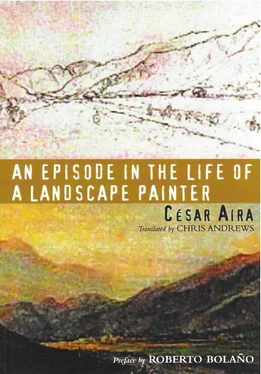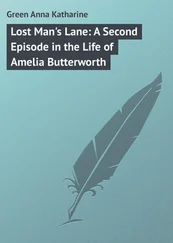Cesar Aira - An Episode in the Life of a Landscape Painter
Здесь есть возможность читать онлайн «Cesar Aira - An Episode in the Life of a Landscape Painter» весь текст электронной книги совершенно бесплатно (целиком полную версию без сокращений). В некоторых случаях можно слушать аудио, скачать через торрент в формате fb2 и присутствует краткое содержание. Год выпуска: 2006, Издательство: New Directions, Жанр: Современная проза, на английском языке. Описание произведения, (предисловие) а так же отзывы посетителей доступны на портале библиотеки ЛибКат.
- Название:An Episode in the Life of a Landscape Painter
- Автор:
- Издательство:New Directions
- Жанр:
- Год:2006
- ISBN:нет данных
- Рейтинг книги:5 / 5. Голосов: 1
-
Избранное:Добавить в избранное
- Отзывы:
-
Ваша оценка:
- 100
- 1
- 2
- 3
- 4
- 5
An Episode in the Life of a Landscape Painter: краткое содержание, описание и аннотация
Предлагаем к чтению аннотацию, описание, краткое содержание или предисловие (зависит от того, что написал сам автор книги «An Episode in the Life of a Landscape Painter»). Если вы не нашли необходимую информацию о книге — напишите в комментариях, мы постараемся отыскать её.
An Episode in the Life of a Landscape Painter
An Episode in the Life of a Landscape Painter — читать онлайн бесплатно полную книгу (весь текст) целиком
Ниже представлен текст книги, разбитый по страницам. Система сохранения места последней прочитанной страницы, позволяет с удобством читать онлайн бесплатно книгу «An Episode in the Life of a Landscape Painter», без необходимости каждый раз заново искать на чём Вы остановились. Поставьте закладку, и сможете в любой момент перейти на страницу, на которой закончили чтение.
Интервал:
Закладка:
Rugendas woke at two, in a dreadful state. Swinging back and forth between sickness and health throughout the course of that incredible day had left him a wreck. Yet he resumed his work without a moment's delay. And the strangest thing was that he did not remove his mantilla, simply because he had forgotten that he was wearing it. He and Krause were in the situation room at the fort, feebly lit by a pair of candles; a murky gloom reigned in that vast space. The poor painter could see nothing through the veil, but did not realize. His vision had been so perturbed during the day, that not being able to see made no difference to him now. Thrashing about blindly, he was an outlandish sight, and his shuffling of the papers attracted the other men's attention. He had taken it into his head to classify the scenes, and since he could not see them, he got so mixed up that the contortions of his body, understandably limited by his shattered nerves, seemed to be mimicking the postures of the Indians. Krause could not bear to see him make a spectacle of himself and slipped out discreetly, as if he were going to relieve himself. Less tactful, the soldiers and ranchers gazed in wonder at the puppet with the wrapped- up head. The obvious solution would have been to tear the rag off, but this did not occur to Rugendas because he was so used to it, while, for precisely the opposite reason, the others were too stunned to act; there was only one person who, being in between these extremes, might have done the sensible thing, but he was not present.
At that moment, Krause was experiencing a revelation of his own. Depressed and preoccupied, he had gone out into the blackest of nights. He could sense the forests and mountains as pure after-images, black forms plunged in an ocean of black. After an uncertain lapse of time spent in melancholy rumination, he suddenly realized he could see everything: the mountains, the trees, the paths, the panoramas with their slightly dreamy perspectives… Was he seeing or remembering? He marveled at the faculty of sight, its prodigious, ultra-physiognomic capacities, the dilation of the pupil, the brain's interpretations. In fact, the moon had come out, that was all. And yet he had not been mistaken.
Back inside, the men had been waiting for the moonlight so they could return to their respective homes. They put on their hats and went out. That was when Rugendas, who had not been entirely oblivious to their conversations, noticed the owner of the ranch where he had stayed the previous night, and by association, remembered his wife and what she had lent him, at which point he finally raised his hands to his face, felt the lace, realized he was still wearing the mantilla and pulled it off without bothering to untie the knots. In spite of the fact that it was now a filthy, malodorous rag, soiled with grease, sweat and dust, he held it out, trying to make his numb tongue articulate words of thanks intended for the rancher's wife. All eyes were fixed on him, in wonder as much as in fright. When the rancher was finally able to respond, he mumbled a no, still mesmerized by Rugendas. What he meant to say was that the painter could return the mantilla himself and thank his wife in person, since he would presumably be returning to the ranch with them to spend the night. But when the monster insisted, he took the rag, and as there was nothing more to say, let the conversation lapse and stood there staring. What an ugly sight! The reason he had initially refused the filthy shroud was that, unconsciously, he had wanted to say: Keep it on.
They all came out together, and when Krause saw them, he went to fetch the horses; he too was assuming that they would return to the ranch from which they had set out that morning. As he approached the group, leading the two beasts, it took him a moment to realize that Rugendas had removed his mask. He had grown used to it too, from the other side. His friends face, fully illuminated by the moonlight, seemed larger now and more frightful. He froze for a moment. The men were beginning to mount and ride off. Krause had thought they would have to carry Rugendas, but there he was, standing, steady enough, except for his face. His face occupied the compartments of the night. Was the moon illuminating his face or was it the other way around?
Be that as it may, Rugendas had made other plans. To Krause's astonishment, he had plans for the rest of the night. Incredible as it seemed, he wanted to go on working. What did it matter if he was ill, since the remedies he had taken allowed him to begin again with undiminished energy? And what could be more common than the act of beginning again? It was being repeated all the time. What else could really be repeated? In the beginning was Repetition, and only there. It was Krause, not Rugendas, who by virtue of his health, was moving along an unbroken line, a continuum, without beginning or end.
Krause did not understand what Rugendas had said to him. The painter's face overpowered everything else, even speech. Besides, there was no time to talk, since they were already riding, just the two of them, not towards the ranch but into the forest, drawn into the twisting funnels and bottlenecks, the horses clattering like bronze octopuses, southwards, towards the unknown, guided by the painter's facial compass. Tall, slender silhouettes, as if they were riding giraffes, all in black yet visible, they sped on, sucked towards another and a further slice of space, slipping in among the black's grey shades. The sound of the galloping hooves preceded them and bounced back, warning of obstacles. In that sense they were like bats. Like the bats that abound in those mountains and come streaming out of their caves at that time of night. And they could feel them brushing past! It is extremely uncommon to feel the touch of a bat, because those little creatures are equipped with infallible anti-crash devices. But a touch is not a crash, and occasionally sheer speed makes a touch unavoidable. Which is what happened to Rugendas on this occasion. A bat coming in the opposite direction brushed gently against his forehead. The contact lasted barely a hundredth of a second; it was hardly distinguishable from a breeze or the chance stimulation of a cell. But in the world of nature, there is always an explanation for delicacy. And this delicacy was supreme, incomparable, not only because of the mechanism that produced the contact, but also because of the material that sensed it: a forehead in which all the nerves had been torn loose. What could possibly be gender or subtler?
This last part of the episode is even more inexplicable than the rest. Yet we cannot doubt that the events really took place, since the artist recorded them in his subsequent correspondence. In his letters he apologizes to family and friends, and principally to his sister, for what he calls his "daring" — though "recklessness" might have been more apt — in going to observe the Indians at close quarters, so he could complete the days sketches, filling in the foregrounds. There is, of course, a certain irony in his words. After all, what could have happened? They might have killed him. A minor detail. In any case, by the time his correspondents saw the resulting pictures, that is by the time his work reached European galleries or museums, he would certainly be dead. The artist, as artist, could always be already dead. There was something absurd about trying to preserve his life. An accident, big or small, could kill a man, or a thousand, or a thousand million men at once. If night were lethal, we would all die shortly after sunset. Rugendas might have thought, as people often do: "I have lived long enough," especially after what had happened to him. Since art is eternal, nothing is lost.
He was in the lead. He had heard the soldiers at the fort say that, after a battle, the Indians usually camped close by. Weary of the distances that had given form to the raid, they could not wait to have done with them and stopped a stone's throw away.
Читать дальшеИнтервал:
Закладка:
Похожие книги на «An Episode in the Life of a Landscape Painter»
Представляем Вашему вниманию похожие книги на «An Episode in the Life of a Landscape Painter» списком для выбора. Мы отобрали схожую по названию и смыслу литературу в надежде предоставить читателям больше вариантов отыскать новые, интересные, ещё непрочитанные произведения.
Обсуждение, отзывы о книге «An Episode in the Life of a Landscape Painter» и просто собственные мнения читателей. Оставьте ваши комментарии, напишите, что Вы думаете о произведении, его смысле или главных героях. Укажите что конкретно понравилось, а что нет, и почему Вы так считаете.












